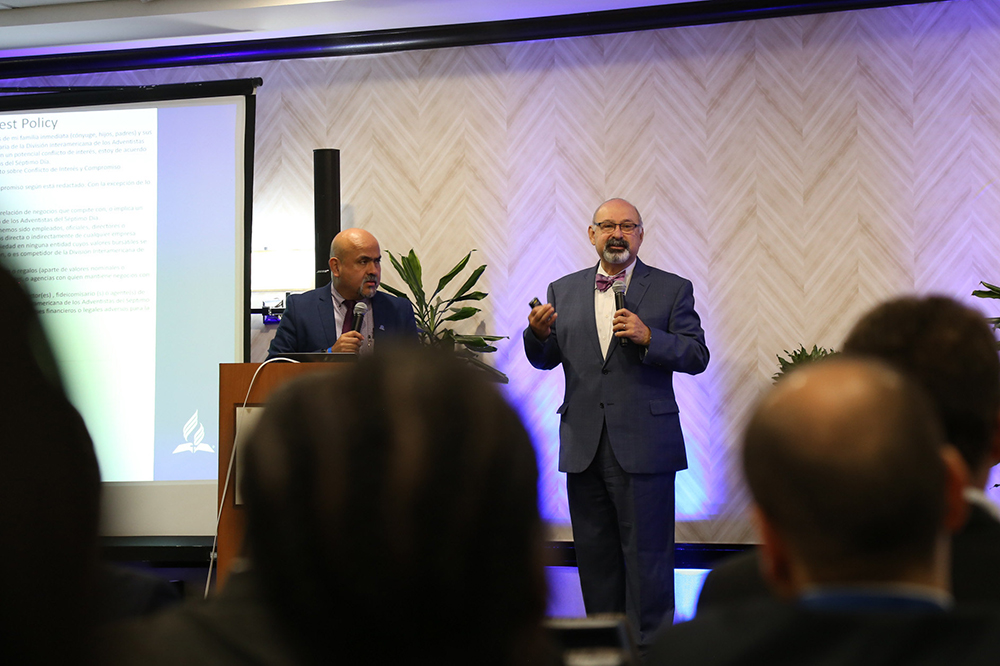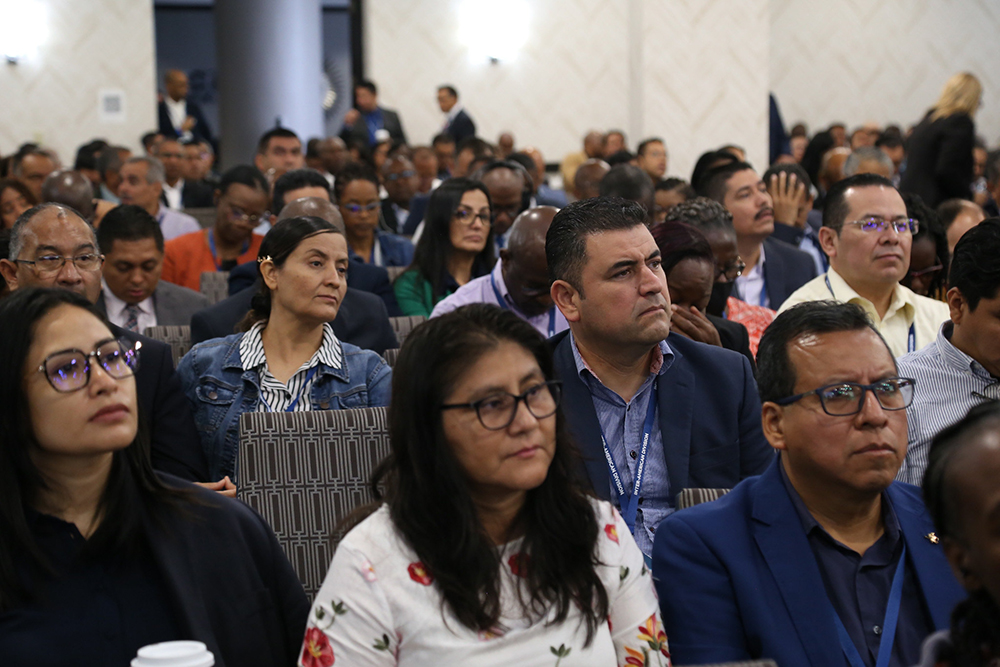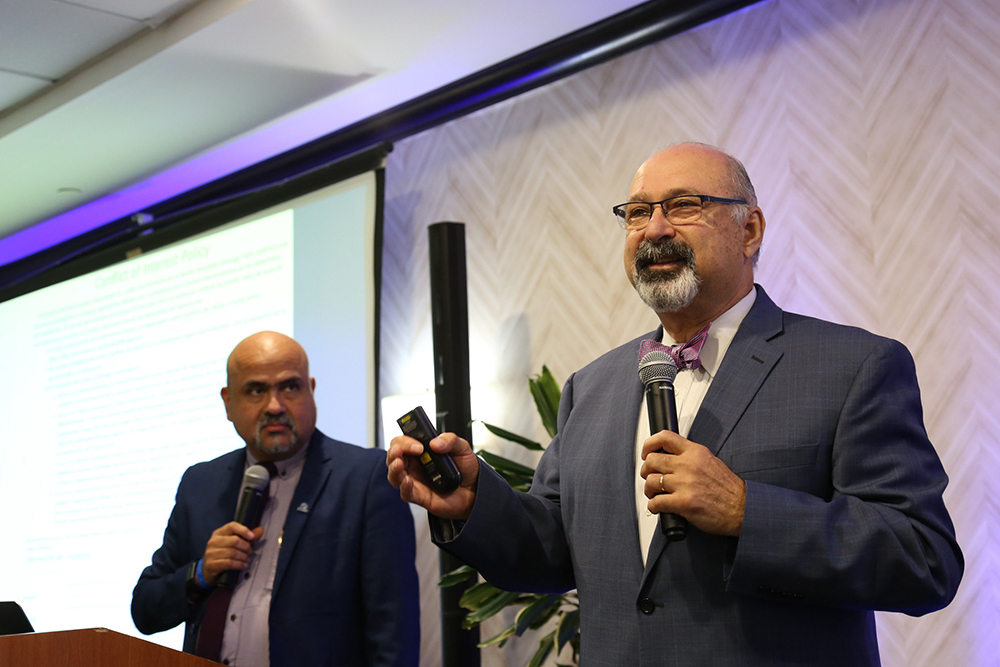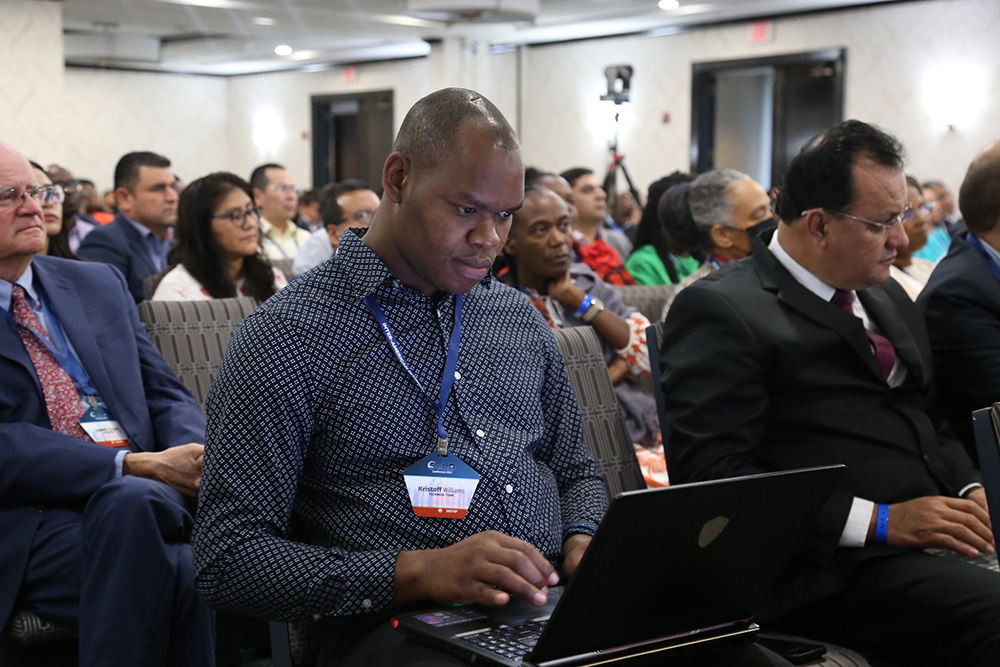Avoiding and Disclosing Conflicts of Interest is Key to Building Trust, Adventist Legal Counsel Says

Karnik Doukmetzian (right), General Counsel for the General Conference speaks to hundreds of church administrators, department directors, educators, pasors and church elders on conflict of interest during day two of Inter-American Division’s segment Leadership Development Conference, Jul. 26, 2023. Gustavo Menéndez (left), personal ministries director of the Guatemala Union translates. [Photo: Libna Stevens/IAD]
“How many of you are on Facebook, Twitter, or Instagram?” General Conference General Counsel Karnik Doukmetzian asked at the beginning of his July 26 presentation at 2023 Inter-American Division (IAD)’s Segment Leadership Development Conference (SeLD) in Miami, Florida, United States. “I see a lot of hands,” he added. “When you first signed on those platforms, there was a box you had to check: ‘Terms and Conditions.’ How many of you read all the terms and conditions before you clicked on the box? Nobody! But then, how do you know what you [accepted]?”
Addressing hundreds of IAD church leaders both in person and online, Doukmetzian brought his point home as he presented a slide with the Seventh-day Adventist Church Statement on Conflict of Interest. It is a document that every church worker is supposed to sign and submit every year. “This is the declaration all of us sign,” he said. “And what do we do? We tick the box without reading it and understanding what we are signing!”
In the following minutes, Doukmetzian set out to explain what conflict of interest is and why is important for church workers to understand it and respect its provisions.
Fiduciary duties
A fiduciary is “a person in a position of authority who is obligated to act on behalf of another in good faith,” Doukmetzian reminded Adventist leaders. “Their duty is to act with loyalty, honesty, and in the best interest of the beneficiary. It is something that includes avoiding conflicts of interests.”

More than 400 IAD church leaders listen to Karnik Doukmetzian (right), General Counsel for the General Conference on conflict of interest, in Miami, Florida, United States, for the annual Segment Leadership Development Conference, while hundreds more took part virtually. [Photo: Libna Stevens/IAD]
Potentials for conflict are not necessarily wrong
In practice, there are many instances that could potentially present a conflict of interest, Doukmetzian said, but not all of them are necessarily wrong. For instance, some Adventist leaders sit on the board of an institution and at the same time chair the board of the institution’s sponsoring church territory.
The IAD policy quoted above also states that “membership held concurrently on more than one denominational committee or board does not itself constitute a conflict of interest. However, an officer, trustee, or director serving on an organization’s board is expected to act in the best interest of that organization,” he emphasized.
What about conflicts of commitment?
Doukmetzian also referred to conflicts of commitment, or “any situation which interferes with an employee’s ability to carry out [their] duties effectively.” He explained that employees on full-time assignment are compensated for full-time employment. “Therefore, outside or dual employment or other activity, whether compensated or not, that in any way interferes with the performance of an employee’s duties and responsibilities is a conflict of commitment,” he read.

General Conference General Counsel Karnik Doukmetzian (right), addresses SeLD delegates during his lecture, July 26, 2023. Gustavo Menéndez (left), personal ministries director of the Guatemala Union translates. [Photo: Libna Stevens/IAD]
The Adventist Church also has a Statement of Ethical Foundations, voted at the church’s Annual Council in 1999. It includes denominational values such as ethical and moral conduct, honesty, integrity, and trust. These values inform in this case the IAD ethical guidelines employers follow, Doukmetzian reminded church leaders. These include, for instance equity, fairness and non-discrimination and compliance with the laws of the land.
At the same time, employees have ethical responsibilities they are supposed to follow. First, read Doukmetzian, “employment in the Seventh-day Adventist Church implies commitment to the organization mission.” And the employees’ reasonable service includes ethical responsibilities such as living a life consistent with the church’s message and mission, and respecting church-owned assets. Also respect for colleagues, efficiency and attention on the job, and integrity on financial matters, among others.
When conflict of interest is suspected
Doukmetzian said that when a situation of conflict of interest is suspected by the person involved or a third party, leaders should determine if it is present, and then document how they handled a particular situation. If known in advance that it will be a situation of conflict of interest, it should be reported right away. On the other hand, if not known in advance, it should be reported when the conflict of interest becomes apparent.
“In short, when conflicts arise, you should avoid involvement,” Doukmetzian said. “If it can be overcome, disclose the conflict in writing and then, if approved continue.” In that context, the person involved should withdraw from the decision-making process about his case. “It means no voting, no participation in consideration, no discussion, and no presence,” he emphasized.

A SeLD delegate takes notes during morning presentation on conflict of interest on Jul. 26, 2023. [Photo: Libna Stevens/IAD]
Some examples
In the last part of his presentation, Doukmetzian reminded leaders about some of the situations that the working policy considers a conflict of interest. They include engaging in outside business or employment; accepting or offering of any gratuity, favor, benefit, or gift; and using denominational personnel, property, equipment, etc., for other than approved activities and programs. He also mentioned expending unreasonable time during working hours in other pursuits and using one’s connections to secure favors to family and friends. “Avoid situations that could discredit, embarrass, or conflict with the organization’s best interests,” he advised.
A potential area for conflict of interest is the use of social media, especially when an employee is using his work or the organization’s account, Doukmetzian explained. He suggested that “if you speak on public uses, do so only if you have been authorized, and avoid speaking in personal capacity, because people will not distinguish between your official and private capacity.” He added, “Do not use the organization’s name, influence, funds… for outside activities without authorization.”
Doukmetzian also advised how to handle family and personal relationships. “You should not hire or supervise family members,” he advised, “and you must disclose family or personal relationships that may cause a conflict.”
Summarizing, Doukmetzian emphasized that anyone can potentially be involved in a situation that is cause of a conflict of interest. “A conflict of interest is not an accusation and does not imply that your judgement has been compromised,” he said. “There’s nothing inherently wrong with having conflicting interests. The issue is how it’s handled.”
Trust is key
At the core of issues related to a conflict of interest is trust, or “the perception of honesty, openness, and reliability,” Doukmetzian said. “Trust is the organizational lubricant. It takes time to develop but can be weakened or broken very easily.”
He ended by rephasing a well-known statement by Adventist Church co-founder Ellen G. White, “The greatest want of the world is the want of men and women who will not be bought or sold, who will not accept or give a bribe… men and women who will not lie, steal or cheat…men and women who are accountable… [and] who will stand for the right though the heavens fall.”